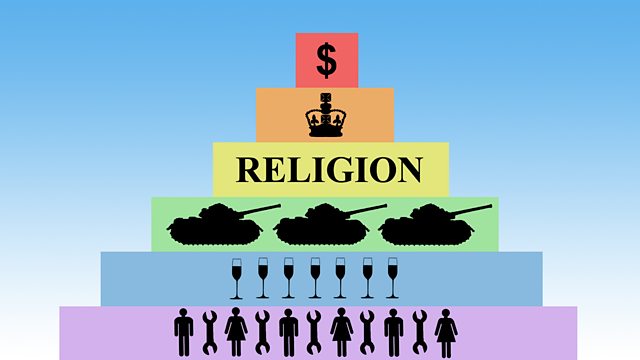Hierarchy
The rise and rise of elites over the last 10 thousand years. With Peter Turchin, Anja Kanngieser and Martin Rowson.
The principle of top down hierarchy seems extraordinarily resilient in human societies. But why have we come to organise ourselves this way? Is it to be more efficient and effective? Or, is it because some people will always be driven by instinctive greed and desire for power?
Bridget Kendall talks to professor Peter Turchin, a biologist trying to trace the hidden dynamics of history, Anja Kanngieser, a social geographer who is interested in alternative networks which link us horizontally, and political cartoonist Martin Rowson, an artist whose work would founder without the rich and the powerful to poke fun at.
(Illustration by Shan Pillay)
Last on
Clip
-
![]()
Martin Rowson: why human hierarchies resemble those of mole rats
Duration: 01:10
Chapters
-
Peter Turchin
The Evolution of Hierarchies
Duration: 11:15
Anja Kanngieser
Challenging the Establishment
Duration: 09:40
60 Second Idea
Swap Bread for Breadfruit
Duration: 05:04
Martin Rowson
Sending up the Powerful
Duration: 12:15
Peter Turchin
![Peter Turchin]()
Professor Peter Turchin was trained as a theoretical biologist, but during the last fifteen years he has been working in the field of historical social science that he and his colleagues call Cliodynamics. He investigates two broad and interrelated questions: what general mechanisms explain the collapse of historical empires? And how did large-scale states and empires evolve in the first place? He has written five books, including War and Peace and War: the Rise and Fall of Empires.
Anja Kanngieser
![Anja Kanngieser]()
Anja Kanngieser is a political and cultural geographer working at the intersections of labour self-organisation, migration, experimental politics, the voice and radio, and a Lecturer at the sociology department at Goldsmith’s College in London. She questions the received wisdom that large groups of people need hierarchies to get anything done swiftly but also cautions that the current trend for flat, ‘horizontal’ organisation in creative businesses may not be as egalitarian as it seems.
Martin Rowson
![Martin Rowson]()
Martin Rowson is a leading British political cartoonist who has been offering us his satirical visual take on the politics of the day for over three decades, working for a number of publications, especially the Guardian newspaper. He says that satirical cartoons are necessary in any society that has leaders. We use them to take control of the people who think that they have control of our lives. It’s a highly democratic, levelling sort of activity in which the great and the good are brought abruptly down to earth.
And you can see some of Martin's illustrations in the gallery on the right hand side of the page.60 second idea
![60 second idea]()
Peter Turchin says that we all should stop eating bread made from wheat and switch to breadfruit. For a lot of people, wheat is unhealthy food, plus changing from wheat to breadfruit and other tropical crops would be a boon to the currently poor tropical countries, e.g., the Caribbean and Pacific islands. In one of the most poignant ironies of the modern world, Pacific Islanders import wheat and other Western foods to which their populations are completely unaccustomed and, as a consequence, they suffer from the highest rates of obesity and heart disease in the world.
Broadcasts
- Mon 15 Dec 2014 03:05GMT����ý World Service Online
- Tue 16 Dec 2014 09:05GMT����ý World Service Online
What is the role of libraries in the digital age?
Podcast
-
![]()
The Forum
The programme that explains the present by exploring the past








